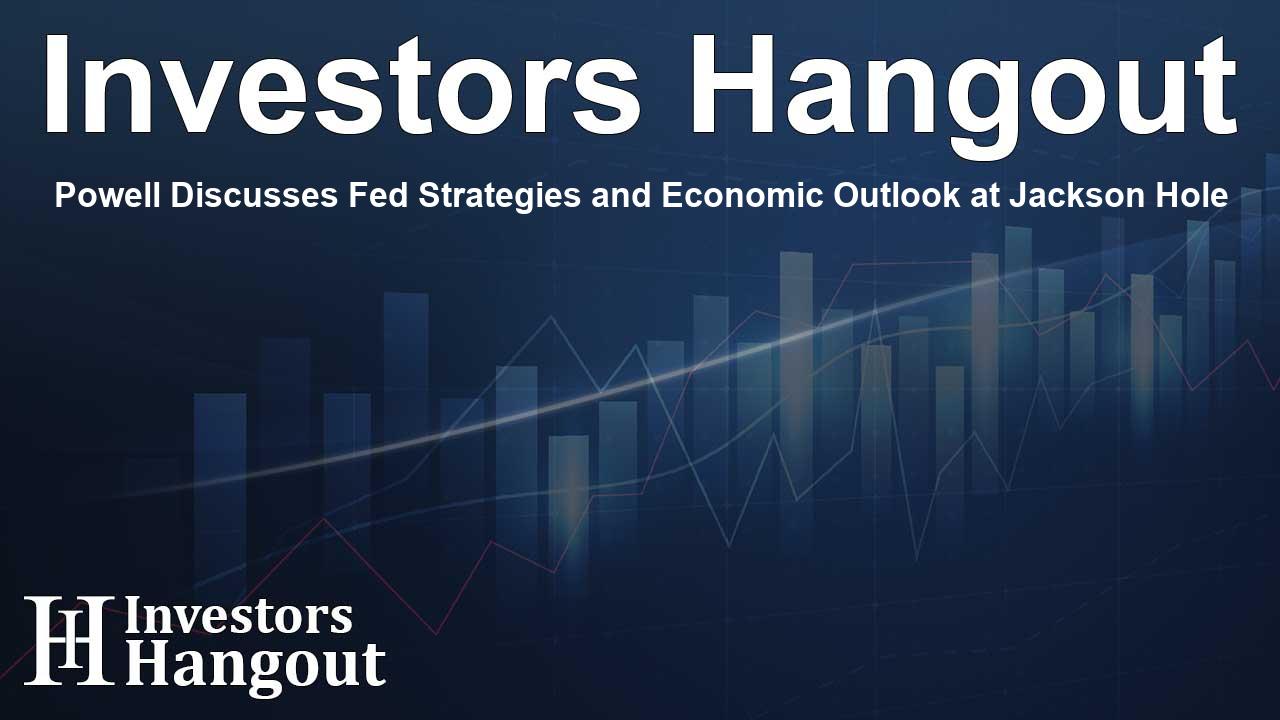Powell Discusses Fed Strategies and Economic Outlook at Jackson Hole

Insights on Economic Policy Transition
This week marks a significant event in economic policy discussion, highlighted by the topic: “Economic Outlook and Framework Review.” However, Fed Chair Powell's upcoming speech is set to provide thrilling insights into the Federal Reserve's decision-making process. Unlike expectations of rate cuts, Powell will emphasize the guiding principles that will shape future decisions based on recent analyses of the economic landscape.
The current economic environment presents a unique challenge, with slower job growth and persistent inflation putting pressure on the Fed's dual objectives of maximizing employment and ensuring price stability. Powell's address aims to intertwine the latest insights from economic data into the Fed's overarching framework for policy-making.
Evaluating the Labor Market Dynamics
A key point of interest during Powell's speech will be his assessment of the labor market dynamics, especially following recent employment reports that reveal substantial job revisions. His comments are likely to delve into supply-side issues, such as immigration policy and demographic shifts. Powell may acknowledge the rising risks associated with decreased labor demand. Additionally, how he characterizes inflation trends—especially in sectors beyond housing—will provide crucial context for understanding the Fed’s monetary policy.
The Balance Between Employment and Inflation
It's essential to recognize that Powell's discussions may carry a hawkish tone, indicating a greater emphasis on managing inflation risks as opposed to simply prioritizing employment growth. This signals a complex balancing act as financial markets anticipate possible shifts in the interest rate landscape.
Modernizing the Monetary Policy Framework
This speech, potentially Powell's last at Jackson Hole in his current role, underscores the importance of reviewing the Federal Reserve's monetary policy framework. The framework signifies a collective agreement among committee members, not just a manifestation of the Fed Chair’s personal views. This reinforces the notion that a new leadership may shape these strategies going forward.
Since Powell has played a pivotal role during his chairmanship, his insights are timely for understanding how the Fed's framework will evolve based on the lessons learned over the last few years. Transparency remains a central theme, with the Fed keen to openly communicate its methodologies and pathway forward.
Lessons and Adaptations from Past Challenges
Historically, the predictions guiding the Fed's strategies have encountered unexpected hurdles, particularly following the 2008 financial crisis. The committee's prior frameworks hinged on assumptions about a sustained low-inflation environment—a notion that has been radically disrupted by the pandemic and subsequent economic fluctuations.
The framework's adaptability is crucial, especially as financial disturbances challenge assumptions made during more stable times. The Fed's commitment to address both sides of its mandate is increasingly significant as it strategizes for the future.
Framework Review and Future Strategies
As the framework undergoes review, it will encompass lessons drawn from recent experiences, informing the Fed's strategic direction. Maintaining the 2% inflation target forms a foundational aspect of this commitment, reflecting the Fed's understanding of its crucial role in long-term economic stability.
Preparing for Current Economic Challenges
The upcoming adjustments in the framework largely stem from a realization of past economic realities. This week’s agenda expresses that the Fed must remain flexible and responsive to evolving economic conditions, particularly given the increased complexities surrounding labor market dynamics.
Powell's ability to guide discussions around this challenge is not only about achieving clarity in communication but also reflects his effective management of the Fed's dual mandate during tumultuous times. Understanding the balance between employment growth and inflation will remain paramount as the Federal Reserve navigates its responsibilities.
Frequently Asked Questions
What is the main focus of Powell's speech at Jackson Hole?
Powell will outline the principles governing the Fed’s decision-making process amidst ongoing economic challenges, particularly regarding inflation and employment.
How does the Fed's dual mandate affect its decisions?
The dual mandate aims for maximum employment and price stability, often creating tension between these goals, especially in fluctuating economic contexts.
What changes can we expect from the Fed's framework review?
The framework will reflect lessons from the past years, particularly in light of unpredictable inflation trends and labor market conditions.
Why is transparency important for the Federal Reserve?
Transparency helps build public trust and facilitates informed decision-making by economic agents, ultimately enhancing the effectiveness of monetary policy.
What role does supply-side factors play in inflation and employment?
Supply-side factors, like demographic changes and immigration policies, can impact labor market dynamics and influence the Fed's response to inflation and employment challenges.
About The Author
Contact Owen Jenkins privately here. Or send an email with ATTN: Owen Jenkins as the subject to contact@investorshangout.com.
About Investors Hangout
Investors Hangout is a leading online stock forum for financial discussion and learning, offering a wide range of free tools and resources. It draws in traders of all levels, who exchange market knowledge, investigate trading tactics, and keep an eye on industry developments in real time. Featuring financial articles, stock message boards, quotes, charts, company profiles, and live news updates. Through cooperative learning and a wealth of informational resources, it helps users from novices creating their first portfolios to experts honing their techniques. Join Investors Hangout today: https://investorshangout.com/
The content of this article is based on factual, publicly available information and does not represent legal, financial, or investment advice. Investors Hangout does not offer financial advice, and the author is not a licensed financial advisor. Consult a qualified advisor before making any financial or investment decisions based on this article. This article should not be considered advice to purchase, sell, or hold any securities or other investments. If any of the material provided here is inaccurate, please contact us for corrections.
